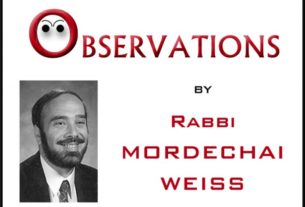Question: What did our sages mean when they said that anyone who resides outside the Land of Israel is like an idol worshipper? Is that what all of us residing outside Israel are – idol worshippers?
M. Goldblum
(Via E-Mail)
‘);
_avp.push({ tagid: article_top_ad_tagid, alias: ‘/’, type: ‘banner’, zid: ThisAdID, pid: 16, onscroll: 0 });
Answer: The source of the requirement to live in Israel is Deuteronomy 12:29: “Ki yachrit Hashem Elokecha et ha’goyim asher ata ba shammah lareshet otam mipanecha, veyarashta otam veyashavta be’artzam – When Hashem your G‑d will uproot the nations that you come to inherit, you shall inherit them and settle in their land.”
Commenting on this verse, the Sifrei recounts the following incident: R. Eleazar b. Shamua and R. Yochanan HaSandlar were traveling to Netzivim to learn Torah from R. Judah b. Beteira. When they reached a place called Tzeidan, they remembered Israel. They raised their eyes and tears began to flow. They then tore their clothing in mourning and recited the verse above. They then turned, reached their destination, and said, “The commandment to dwell in Israel is equivalent to all the other commandments of the Torah.”
Pe’at HaShulchan (ad loc.) notes that these amora’im lived after the destruction of the Holy Temple, which means that their statement applies even today and that the requirement is biblical. (They never would have said that living in Israel is equivalent to fulfilling all the commandments in the Torah if the requirement were only rabbinic nowadays.)
We find the same statement in the Tosefta (Avodah Zarah 5:2): “One should dwell in Israel, even in a city where the majority are idolaters, rather than in the Diaspora in a city which is inhabited completely by Jews. This teaches us that living in Israel is equivalent to [fulfilling] all the commandments of the Torah.”
The Torah Temimah (Parshat Re’eh) wonders why this commandment should be equivalent to all others. He suggests that fulfilling all the mitzvot is impossible except in Israel since a number of mitzvot are conditional on living in the land. Thus, the statement that living in Israel is equivalent to fulfilling all the mitzvot of the Torah means that only in Israel can one fulfill all the mitzvot.
The Ramban lists settling in Israel as one of the positive precepts of the Torah. The Rambam, however, does not.
The Ramban bases his opinion on Numbers 33:53: “Ve’horashtem et ha’aretz viyshavtem bah, ki lachem natati et ha’aretz lareshet otah – You shall inherit the land and dwell in it because I have given the land to you in order that you inherit it.” (The Ramban does not cite Deuteronomy 12:29.)
In his commentary to this verse, Rashi writes that this verse teaches us a lesson: Only by inheriting the land (which requires taking it from its present occupants) can we exist in it. Otherwise, we will be unable to exist in it.
The Tosefta’s statement is quoted and greatly expanded upon in Ketubot (110b). The Gemara states, “A person should at all times live in Israel even in a city where most of the inhabitants are idolaters, but one should not live outside the land even in a city where the majority are Jews, because one who lives in Israel is considered as if he has a G-d and one who lives outside the Land is compared to one who has no G‑d, as [Leviticus 25:38] states, ‘Ani Hashem Elokeichem asher hotzeiti et’chem me’eretz Mitzrayim latet lachem et eretz Canaan li’h’yot lachem l’Elokim – I am Hashem your G-d who has taken you out of the land of Egypt to give you the land of Canaan, to be your G-d.’”
The Gemara’s assumption is that upon entering and settling in Israel, one automatically acknowledges Hashem. Conversely, one who does not live in Israel does not automatically acknowledge G-d (and thus may be compared to an idolater).
In this light, continues the Gemara, we can read the statement by David made before Saul (I Samuel 26:19): “Ki gershuni hayom mehistape’ach benachalat Hashem lemor, lech avod elohim acherim – For they have chased me away this day from joining the inheritance of Hashem, saying, ‘Go serve other gods.’”
The Gemara observes that we are not informed that anyone told King David to worship other gods; therefore, King David must be telling us that living outside the land is like worshipping idols.
The Maharsha asks: Surely Hashem is the G-d of the whole world. So how can someone who lives outside Israel be referred to as being without a G-d? He explains that the Gemara means that a person living outside of Israel is considered like the many nations who worship idols.
We can conclude that not only is it a positive Torah precept to live in Israel, as the Ramban states, but also that living outside Israel is spiritually dangerous.
If so, we are left with a serious dilemma. Now that there is a State of Israel, how do we explain our continued presence in America and other countries? How do we explain the behavior of the many gedolim who live outside Israel?
(To be continued)
<!–
Publisher #16: JewishPress.com
Zone #113: Comment Banner / (02) / News
Size #15: Banner 468×60 (Comments and Mobile) [468×60]
–> ‘);
_avp.push({ tagid: article_top_ad_tagid, alias: ‘/’, type: ‘banner’, zid: ThisAdID, pid: 16, onscroll: 25 });




